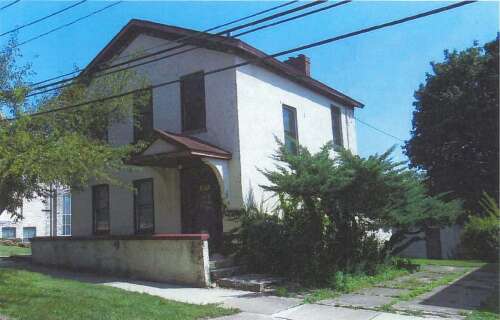The Barry House is at 217 Cedar Ave. in St. Charles.
Courtesy of the city of St. Charles
A 180-year-old house in St. Charles will remain for the time being after a city council committee this week postponed a decision on whether the owner can demolish the structure.
The home at 217 Cedar Ave. in downtown St. Charles, known as the Barry House, was built in 1844. In the mid-1800s, it was the residence of Judge William D. Barry, and Abraham Lincoln is believed to have stayed there while visiting Barry.
Baker Memorial United Methodist Church, which has owned the Barry House since 1993, is seeking permission from the city to demolish the home to make way for a parking lot.
A certificate of appropriateness (COA) from the city is needed before a building in a historic district can be town down.
In October, Baker Memorial United Methodist Church petitioned the Historic Preservation Commission for a COA to demolish the Barry House and an adjacent structure at 211-215 Cedar Ave.
While the church received the OK to demolish the building at 211-215 Cedar Ave., it did not get a positive recommendation to demolish the Barry House.
The church then took its request to demolish the Barry House to the city council’s Planning and Development Committee, which can overturn the commission’s recommendation.
Members of the Planning and Development Committee reviewed the request during a meeting on Monday.
Historic Preservation Commission Chair Kim Malay explained why the commission recommended denying the COA.
Malay said their main reasoning was the building’s historical significance. She also expressed the commission’s dissatisfaction with the owners’ lack of effort to sell the property, stating that it was never listed on an MLS and the church denied an offer that was made.
Church representatives Brian Harris and Peter Vargulich, Pastor David Aslesen and attorney John Hoscheit spoke at the meeting on behalf of the church.
The reasoning behind the desire to demolish the homes included the financial burden the properties put on the church, the structures’ deterioration to the point they are uninsurable, and the fact that they have been the target of several break-ins, trespassing and vandalism in recent years.
“I think the bottom line here is; if the structures are removed it will actually enhance the experience for people that come to downtown St. Charles and visit our other historic structures,” Hoscheit said. “We believe without a doubt that this would be the best thing to happen there.”
After some discussion, Alderperson Jayme Muenz made the motion to postpone the decision to give the church and city staff more time to work through potential alternatives to demolition.
“I think it’s our opinion that anytime things can move forward without government intervention, that’s really preferred,” Muenz said.
Committee members approved the postponement in a unanimous vote.
Harris said while the postponement was not ideal, the church was amenable to the idea, provided they have the assurance that they will receive full support and cooperation from city staff in the ensuing discussions.
“We’ve waited a long time, and we’re tired of waiting,” Harris said.
